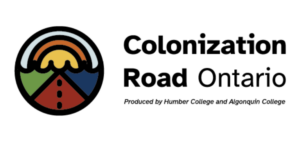Learn about colonization with interactive Indigenous timeline
Posted on Wednesday, February 7th, 2024
Kerry Potts wants people to learn about colonization. Formerly a professor at Humber College, Potts began co-creating an interactive timeline in 2022 to help fellow teachers share the ongoing history of colonialism in Ontario, Indigenous resistance efforts and other topics relating to governance and Indigenous knowledge.
Humber College, Potts began co-creating an interactive timeline in 2022 to help fellow teachers share the ongoing history of colonialism in Ontario, Indigenous resistance efforts and other topics relating to governance and Indigenous knowledge.
Upon moving back to Ottawa and beginning her work as a professor and Indigenous Pedagogy and Curriculum Consultant at Algonquin College, Potts continued working on this project with a small team that included professors from Humber, filmmaker Michelle St. John and Indigenous designer Katie Wilhelm. The team created an interactive and comprehensive tool to complement courses and programs taught at Ontario post-secondary institutions Colonization Road Ontario: A Timeline is now available for free to educators in Ontario.
According to the website, “this timeline highlights events related to colonization in Ontario from an Indigenous perspective. It is inspired by the documentary Colonization Road directed by Michelle St. John which reveals how “colonization roads” led to the colonization of Indigenous territories and the displacement of First Nations People. Because colonization is an ongoing process, this timeline is also an ongoing project that will change over time.”
Colonization roads were created in the mid 1800s to connect communities and offer land to new immigrants. This is addressed in the film and on the timeline. The film can be viewed on the Algonquin College Library website.
“The timeline begins with creation stories, because Indigenous presence on these lands greatly predates the history of colonization,” said Potts. “These roads changed our cultures, our governance, our knowledge and of course the landscape. As you move through the timeline, artist Katie Wilhelm designed a background that illustrates that changing horizon.”
The timeline also acts as a springboard to weave and “braid” different subjects into a curriculum, said Potts. “We have Indigenous philosophers and astronomers, but we always reference Plato and Galileo, and using this timeline we can showcase that art, philosophy, governance structures, activism and cultures have always been here, and so Indigenous voices and topics aren’t siloed.”
The timeline is visually interesting, easy to navigate and allows straightforward ways to review information and explore events of particular interest. There are over 103 entries from creation stories to the first entry on the timeline of 1142 right up to 2023.
For more information contact Kerry Potts at pottsk@algonquincollege.com. or visit the Colonization Road page on the Learning and Teaching Services website.
- Posted in
- Uncategorized